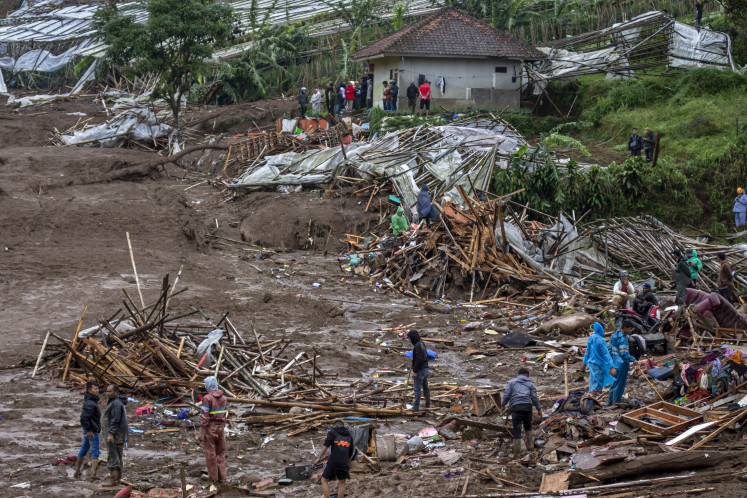Popular Reads
Top Results
Can't find what you're looking for?
View all search resultsPopular Reads
Top Results
Can't find what you're looking for?
View all search resultsAviation law change may mean mergers
Due to stricter operating standards to be imposed based on the newly passed amendments to the aviation law, the country is expected to see airline operators merging to avoid the risk of losing their operating certificates
Change text size
Gift Premium Articles
to Anyone
Due to stricter operating standards to be imposed based on the newly passed amendments to the aviation law, the country is expected to see airline operators merging to avoid the risk of losing their operating certificates.
The law will also open up possibilities for the private sector to operate airports following the government's termination of the monopoly previously held by state-owned airport operators PT Angkasa Pura I and II, which now manage 25 airports nationally.
Transportation Minister Jusman Syafii Djamal told reporters Wednesday that among the strict minimum requirements for airline operators there would now be a rule that they should own at least five aircraft and rent at least five more, as well as conforming to safety regulations.
"Operating airlines must prove themselves financially capable, otherwise they may undermine the nation's flight safety ratings," Jusman said.
He said some airlines might have to undertake mergers in order to meet the required standards on the approved number of aircraft to be held by each operator, as well as safety and service requirements and that the previous 1992 aviation law had not been so strictly enforced.
"The state will benefit more from fewer yet more reliable airlines," he said.
According to Jusman, the government will give a three-year adjustment period before the law becomes fully operational.
"The airlines will have enough time to negotiate the mergers," he said and five new government regulations would be put in place as a result of the new law.
The ministry's director general of air transportation, Budi Mulyawan Suyitno, said the government expected to see around 17 airlines operating nationally in the coming period as a result of these regulatory changes.
Currently, there are 14 airlines already operating in Indonesia with 964 aircraft flying 167 routes. The figures would probably increase as about 30 new companies are in the process of seeking operating licenses, but the new rules will also promote some rationalization.
Under the new law, a new regulator will be set up to oversee airport businesses and to facilitate that commercial interests may invest in Indonesia's currently state-run airports.
Airport operators will no longer manage the air traffic control and navigation systems, which will become the direct responsibility of the government, as occurs in many other countries where the military often runs air traffic control.
Analysts believe the private sector needs to participate in managing airports as the current services provided by Angkasa Pura are considered extremely low in quality, especially those at the Soekarno-Hatta international airport.
The downside of the law, however, includes the government's role in determining the ceiling for economic class airfares -- a move deemed by many as being against free market business principles by which the private sector should decide the tariffs to make the industry more viable.
Other key items in the law
1. Disabled people, the elderly and children under 12 years of age should receive special treatment, including access to additional seats and caretakers.
2. Airlines are required to provide compensation to passengers who fail to get on board in the form of an alternative flight schedule, and accommodation should they fail to get the next flight.
3. Airlines are required to have air operator certificates and operating certificates, as well as having a guaranteed supply of aircraft spare parts.
4. An independent committee will be formed to investigate accidents in the airline industry.
5. Violators of the regulations may get a maximum of eight year imprisonment, and a minimum financial fine of Rp 300 million (US$26,500) and maximum of Rp 2.5 billion.










